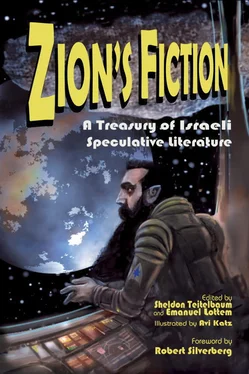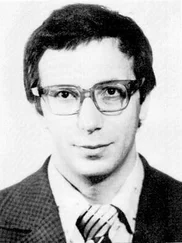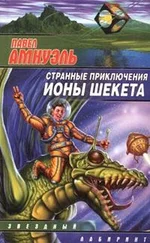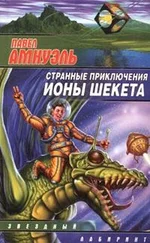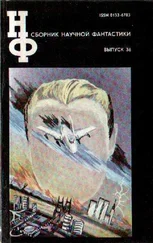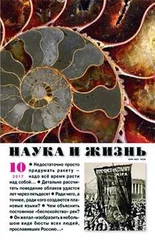The media waxed hysterical. The Sky News cameraman used the opportunity to crash again into Nissim, even though he wasn’t in his way at all. I couldn’t take it any longer and pushed him back. The cameraman fell down on the grass, but immediately got up and raised his minicam, taking no notice of me. That should teach him for interfering with a policeman in the fulfillment of his duty.
I took Nissim by the hand, and we ran forward with all those reporters and cameramen. When the police tried to stop me, I pointed at the heavily breathing Nissim and said, “I’m with him!” and they let me go through.
Max was sitting on Tony’s back, absorbed in deep meditation. The reporters made a siege circle around them and kept asking a thousand questions: “How does the UFO look inside? Who were the creatures flying it?” and the question that was repeated the most, “What was the message?”
To the reporters’ utter amazement, it was Tony the donkey who opened his mouth and answered all their question like a veteran spokesperson, in near perfect Hebrew and then almost fluent English. Sometimes it was a bit hard to understand him, because of the structure of his mouth, ’cause every word came out as kind of a braying “ brrr ….”
Eventually the reporters realized that while a talking donkey was indeed a hell of an attraction and a hot news item, he wasn’t going to betray (bray?) any real information about the UFO’s cosmic message. So they returned to questioning Max, who wouldn’t give them the time of day. When he got fed up with all this aggravation, he opened his eyes and stretched his neck. Silence fell among the ranked reporters.
Quoth Max, “It was a personal message for me. Can’t tell you what they said.” Before the stunned reporters could make a protest, he gave Tony a kind of giddyup with his knees. Tony made a sprint, jumped mightily above the alarmed reporters, who immediately ducked for cover, and started galloping west. He and Tony rode into the sunset, which indeed had amazing pink and orange hues to it. I thought, now they’re going to take them a bit more seriously.
When I came back home, I lay on my bed staring at the ceiling, with the light on, for I don’t know how long, until I got tired of it. Then I called Mr. Eliahu. Mr. Eliahu was my landlord, and a highly valuable archaeological relic he was, too. It’s a wonder the Antiquities Authority hadn’t laid their hands on him a long time ago. He dates back to the time they still thought they could set up a proper European nation here, where people will be nice and decent with each other. This is why he was called “Mr. Eliahu.” His first name was Naphtali, but no one, not even his wife, I think, called him that. When I’d told him I was from Ra’anana he got terribly excited and said that that was where he’d met his wife, working at the Ra’anana orange groves in June of ’47. They were building a homeland, but the entire experiment blew up in their faces once the Levantine Indians took over, he said. Now, I decided, Mr. Eliahu is going to get a living demonstration of Levantine Indiancy, courtesy of the Bezeq Phone Co.
Mr. Eliahu’s Hebrew was old-fashioned. He was capable of saying things like “You shall pay me right on the dot for being exceeding kind to you, Mr. Menashe.” I told him, “Naphtali sweetheart, I got fired from my job, my overdraft passed the five thousand shekels mark already last week, I don’t have a penny in my pocket, and I’m rotting away at home all day not even looking for a new job. So you can forget about your money. I don’t intend to pay you any. You won’t see a penny coming from me to you. You’ve made enough money at the expense of losers like myself. What are you going to do with so much money? You’re already rotten inside and half dead. Forget about it, Naphtali sweetheart. You won’t see a penny from me.”
Mr. Eliahu was not fazed one bit. Apparently I was not the first Indian to hit him. He said dryly, “I understand you, Master Menashe. I understand you much better than you realize. Just be advised that breach of contract is a serious matter—you are in way over your head in this.”
“Naphtali sweetheart,” I rudely interrupted him, “you can take your contract, roll it tight and good, and shove it deep inside your asshole!”
I hung up on him. Now it looked like I was on the right track, having greatly enhanced my prospects of becoming homeless. I’ve always wondered whether City Hall’s wooden benches were good to sleep on.
Wandering footloose in the city did nothing to improve the way I felt. I couldn’t stop looking at the benches, asking myself which one was going to be my home. Rows of benches kept passing in front of my eyes whenever I closed them—and this was getting too hard to bear. I felt I had to relax, clear my head somehow.
That’s why I gladly accepted Ahmed the alte zachen’s invitation. He was sitting in the Yemenite’s kiosk in Cordovero Street, near the Lehi Museum, looking bored.
“Backgammon?” he asked. “Come on, set it up,” I said to him, “but only if you feel like losing.” Ahmed smiled under his moustache, took out a packet of Time, offered me one, and lit another for himself. To Yossi he said, “Two black coffees, my man, and make it strong.”
“You talk too much, you,” said Ahmed, opening up the board and laying it on the brown Formica table. He arranged the pieces in a dizzying speed, rolled a die to see who goes first, and got a six. Ahmed stared at me with his one good eye, the other one roaming uselessly in space. “Play for money?” he asked.
“No thanks, I’m broke,” I said and rolled my die. Got a one. “Never mind,” said Ahmed, “coffee’s on me.” “You start,” I said to Ahmed. We played silently, not talking at all, rapidly moving those worn-out pieces. The only sound was the rattle of rolling dice, until the end of the first game, which I lost to Ahmed by a gammon.
“You talk too much, you,” said Ahmed again, never raising his eyes from the board. “All day long, your head’s just running around thinking about girls, about life, you never notice what’s going on ’round you. You’re all like that. All day long, your head’s into bilosophy and girls, not looking where you’re going.” Ahmed stressed the b in bilosophy to show his disdain. When he spoke Hebrew he hardly had any accent, usually, and he could pronounce his p s without any difficulty, unlike so many Arabs. I had a feeling that since the accident Ahmed was rather bitter with us Jews.
As well he should be. A week before, he got a new donkey, but they didn’t quite get along. The donkey couldn’t understand what Ahmed wanted it to do. Wouldn’t move an inch, and when Ahmed told it what he thought about it, the donkey broke two of his ribs with a massive two-hoofed back swing. Ahmed returned the donkey to the person he bought it from, and since then he’s been sitting all day at the Yemenite’s, inviting passers-by to backgammon and coffee, trying not to breathe too deeply. It’s not like he’s out of pocket. Tony puts money in his bank account twice a week. But this is not what you’d call living. Ahmed is a man of principles and dignity. He shouldn’t be living on handouts from his previous donkey, like a beggar.
Ahmed offered me another cigarette, took a long and noisy draft from his cup of coffee, and said to me, “Believe me, Ido. You have nothing to worry about, you. In the end, everything will be back the way it used to be. I’ve got eyes, I see people, and I’ve been around some. Last year it was Kabbalah, two years ago it was Hare Krishna, five years ago, Emin. Soon this too will get out of their system, the way all the others did.”
“ Inshallah ,” I closed our conversation. Wind started blowing, sweeping with it droplets of rain from the sea. We picked up the table, moved it inside the kiosk, and kept on playing, fast and silent. Eventually I beat Ahmed twelve to two, got up, and shook his hand. Ahmed ordered some more coffee. I went back to the apartment.
Читать дальше
